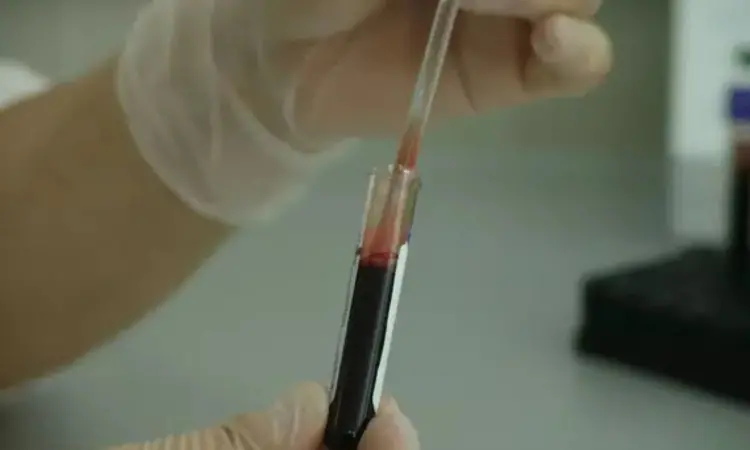- Home
- Medical news & Guidelines
- Anesthesiology
- Cardiology and CTVS
- Critical Care
- Dentistry
- Dermatology
- Diabetes and Endocrinology
- ENT
- Gastroenterology
- Medicine
- Nephrology
- Neurology
- Obstretics-Gynaecology
- Oncology
- Ophthalmology
- Orthopaedics
- Pediatrics-Neonatology
- Psychiatry
- Pulmonology
- Radiology
- Surgery
- Urology
- Laboratory Medicine
- Diet
- Nursing
- Paramedical
- Physiotherapy
- Health news
- Fact Check
- Bone Health Fact Check
- Brain Health Fact Check
- Cancer Related Fact Check
- Child Care Fact Check
- Dental and oral health fact check
- Diabetes and metabolic health fact check
- Diet and Nutrition Fact Check
- Eye and ENT Care Fact Check
- Fitness fact check
- Gut health fact check
- Heart health fact check
- Kidney health fact check
- Medical education fact check
- Men's health fact check
- Respiratory fact check
- Skin and hair care fact check
- Vaccine and Immunization fact check
- Women's health fact check
- AYUSH
- State News
- Andaman and Nicobar Islands
- Andhra Pradesh
- Arunachal Pradesh
- Assam
- Bihar
- Chandigarh
- Chattisgarh
- Dadra and Nagar Haveli
- Daman and Diu
- Delhi
- Goa
- Gujarat
- Haryana
- Himachal Pradesh
- Jammu & Kashmir
- Jharkhand
- Karnataka
- Kerala
- Ladakh
- Lakshadweep
- Madhya Pradesh
- Maharashtra
- Manipur
- Meghalaya
- Mizoram
- Nagaland
- Odisha
- Puducherry
- Punjab
- Rajasthan
- Sikkim
- Tamil Nadu
- Telangana
- Tripura
- Uttar Pradesh
- Uttrakhand
- West Bengal
- Medical Education
- Industry
Intravenous Sepsivac effective in Treating Gram-Negative Sepsis

A recent study by Rajat Agrawal found that the intravenous (IV) administration of Sepsivac® - an immunomodulator containing mycobacterium w (Mw) - holds great promise in treating patients suffering from severe gram-negative sepsis. The results were published in the Journal of the Association of Physicians of India.
Gram-negative sepsis, a severe condition triggered by bacterial infections, has been a major challenge for healthcare providers due to its high mortality rates and limited treatment options. Traditionally, Mw has been administered intradermally (ID), restricting the dosage to a mere 0.1 mL per injection. However, this new research explored the alternative route of IV administration, allowing for the delivery of 0.3 mL of Inj Sepsivac® diluted in 100 mL of normal saline over a slow infusion spanning at least 15 minutes. The treatment was administered daily for three consecutive days.
The study's primary objective was to monitor the efficacy of the IV route by evaluating changes in vital parameters, sequential organ failure assessment (SOFA) scores, and laboratory investigations. Additionally, the researchers closely observed safety measures, including the occurrence of allergic reactions, anaphylaxis, site of infection, and any potential secondary infections. Each patient was followed up for 14 days from the day of enrollment to assess the long-term effects of the treatment.
The results were promising. The study reported a mean age of 62.67 ± 12.77 years among the patients, with a higher prevalence of males (63.3%). Pneumonia (40.1%) and intraabdominal infections (26.7%) were identified as the most common etiologies of gram-negative sepsis in the cohort. From day 2 of treatment onward, significant improvements were observed in all vital signs and mean SOFA scores.
More than half of the patients required ventilator support (56.7%), indicating the severity of their condition, and a 25% mortality rate was observed. However, none of the patients developed secondary infections, reassuring the safety profile of Inj Sepsivac® IV. Furthermore, laboratory parameters improved, and oxygen requirements were reduced from day 4 till the end of the treatment period compared to baseline.
Source:
Agrawal, R. (2023). Efficacy and Safety of Injection Sepsivac® (Heat-killed Mycobacterium W) in Gram-negative Sepsis administered via an Intravenous Route. In Journal of the Association of Physicians of India (Vol. 71, Issue 05, pp. 61–64). Jaypee Brothers Medical Publishing. https://doi.org/10.5005/japi-11001-0221
Neuroscience Masters graduate
Jacinthlyn Sylvia, a Neuroscience Master's graduate from Chennai has worked extensively in deciphering the neurobiology of cognition and motor control in aging. She also has spread-out exposure to Neurosurgery from her Bachelor’s. She is currently involved in active Neuro-Oncology research. She is an upcoming neuroscientist with a fiery passion for writing. Her news cover at Medical Dialogues feature recent discoveries and updates from the healthcare and biomedical research fields. She can be reached at editorial@medicaldialogues.in
Dr Kamal Kant Kohli-MBBS, DTCD- a chest specialist with more than 30 years of practice and a flair for writing clinical articles, Dr Kamal Kant Kohli joined Medical Dialogues as a Chief Editor of Medical News. Besides writing articles, as an editor, he proofreads and verifies all the medical content published on Medical Dialogues including those coming from journals, studies,medical conferences,guidelines etc. Email: drkohli@medicaldialogues.in. Contact no. 011-43720751


